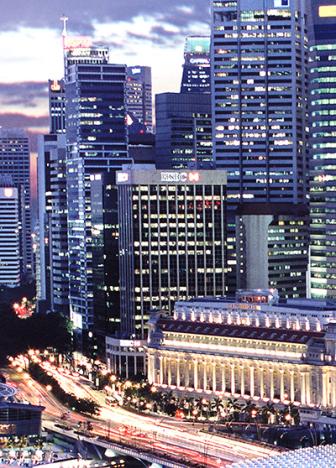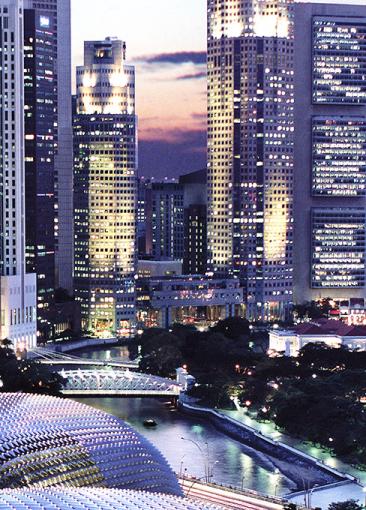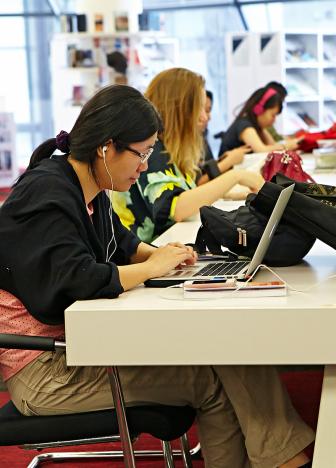Studying in Singapore
Reputed for its focus on productivity and efficiency, as well as a robust and safe info-technology infrastructure, Singapore is the perfect place for the convergence of the world’s best talents and companies.
- An exciting time and place to be for aspiring artists to discover art, design, fashion and music through some of the world’s best that visit our shores.
- Host to many world-renowned artists.
- Vibrant and diverse mix of traditional and contemporary arts.
- Strong support from the Singapore Government for the creative industries.
Useful Information
The College provides a dynamic learning environment through a comprehensive range of student support services.
Find out more here.
Singapore’s weather is generally warm and humid, ranging from an average of 31°C (88°F) during the day and 24°C (75°F) at night. It rains throughout the year, especially during the monsoon season from November to January. Generally, Singaporeans tend to dress casually. Loose and light clothing is recommended for comfort.
You can live frugally yet comfortably in Singapore. Or you can choose to live it up and enjoy the pleasures of metropolitan living. It's all down to budgeting. As an international student, you know the importance of budgeting wisely to live at a standard you are comfortable with.
Here's a rough guide of what you may be spending on every month. Actual expenses will vary according to your lifestyle and personal preferences.
Shoestring: Set aside approximately S$700 to S$900 per month
You share a room in a small HDB flat in the heartlands or suburbs; and eat simple meals at home or at hawker centres.
You walk or cycle to and from the Institution, occasionally taking public transport, but rarely taxis.
You make few overseas calls; your mobile phone subscription plan is the cheapest available.
During your free time, you enjoy low-cost or free activities like hiking in the park or swimming at a public pool.
Moderate: Set aside approximately S$1,200 to S$1,600 per month
You have your own room, but share a HDB or private apartment in the suburbs with one to three housemates.
You eat at hawker centres and food courts, and go to mid-range cafes and restaurants now and then.
Only occasionally do you use the air-conditioner and take taxis.
You subscribe to value-for-money plans for Internet and mobile phone access.
During your free time, you may catch a movie or go window shopping.
Once in a while, you may visit a club or take a day trip to a neighbouring country.
Comfortable: Set aside approximately S$2,000 to S$3,000 per month
You share a private apartment in the city with one or two housemates; the apartment’s amenities may include a gymnasium, tennis court and swimming pool.
You eat at mid-range cafes and restaurants, and shop at specialty supermarkets.
You use the air-conditioner almost every night and make regular overseas calls.
You often take taxis.
During your free time, you may frequent clubs and pubs, take up indulgent pastimes like scuba diving and wakeboarding, and occasionally travel to neighbouring countries.
Singapore banks offer savings and cheque services, as well as other financial services such as bank drafts, fund transfers and currency exchanges. Traveller’s cheques can also be cashed at banks, where you will need to present your passport for identification.
Before deciding on a bank and type of account, you should compare interest rates, bank fees and accessibility features. Typically, students open an account that gives them an automated teller machine (ATM) card. This makes cash accessible round-the-clock via ATMs. Most ATM cards also act as debit cards on the local Network for Electronic Transfers (NETS), which can be used at supermarkets and many retail outlets.
Banks In Singapore
DBS/POSBank: www.dbs.com
Overseas Chinese Banking Corporation (OCBC): www.ocbc.com.sg
United Overseas Bank (UOB): www.uobgroup.com.sg
HSBC: www.hsbc.com.sg
Standard Chartered Bank: www.sc.com/sg
Citibank: www.citibank.com.sg
Maybank: www.maybank2u.com.sg
Opening an account
To open a bank account, you have to visit the bank in person. You will also need the following documents:
- Valid passport.
- Student Pass.
- Initial deposit (amount varies according to bank).
- Study loans and financial aid.
If you require financial assistance during your studies in Singapore, please secure a loan in your home country. Currently, banks in Singapore do not offer loans to international students.
Medical facilities in Singapore are of a high standard and are readily available. A visit to a general practitioner (GP) costs around S$30. Singapore’s public hospitals will accept self-referred patients.
Vaccinations are required only if you come from a yellow-fever area. Singapore is not in the malaria zone.
One of the main health concerns pertains to the tropical climate. To avoid dehydration, drink plenty of water throughout the day.
As a student in LASALLE, you are are required to be familiar with Singapore laws e.g. drug trafficking, working illegally, overstaying on expiry of passes, etc.
For more information and updates:
Immigration and Checkpoints Authority of Singapore
Singapore Police Force
Ministry of Manpower
You will find a wide choice of accommodation in Singapore. Based on your needs and budget, you can easily rent an apartment or room in a private development or public housing estate.
Need help?
The Division of Student Administration can help you get started on your house-hunt, advise on locations, and put you in touch with fellow students seeking housemates.
Before you start
First, be honest about what you can afford. The rental market in Singapore has been rising over the past year. Good places offering great value are easily snapped up within days, even hours. Do your sums carefully, and work out what you can comfortably afford to pay for monthly rental before you start looking.
How will you get to campus every day?
Explore the bus and MRT routes from your prospective home. Check out the frequency and waiting times as well.
The following neighbourhoods are within walking distance to the campus:
Selegie, Bugis, Bras Basah, Dhoby Ghaut, Little India (Serangoon Road) and Jalan Besar
The following neighbourhoods are a five- to fifteen-minute commute to campus:
Orchard Road, Newton, Bukit Timah, Farrer Park, Boon Keng, Potong Pasir and Lavender
The following neighbourhoods are within a half hour’s commute to campus and may present much cheaper options:
Kallang, Aljunied, Geylang, MacPherson, Katong, Marine Parade, Chinatown, Tiong Bahru, Queenstown, Holland Village, Balestier, St Michael’s and Toa Payoh
What’s out there?
There is plenty to choose from. Use this table to make sense of your options.
| Accommodation type | Average monthly rental |
|---|---|
Book a bed in student hostels |
From S$420 for a quad-sharing room to S$550 for a double or triple-sharing room. Some hostels may have single rooms at a premium. |
| Rent a HDB flat (alone or with flatmates) | From S$1,700 for a 3- or 4-room HDB flat (i.e. 1-2 bedrooms) in the city and from S$1,500 for flats on the outskirts of the city. |
| Rent a room in a HDB flat |
From S$450 if you live with the owner/family From S$550 if you live with other singles. HDB room rentals in the city start from S$700. |
| Rent a private apartment (alone or with flatmates) |
From S$1,800 – S$2,500 for a 2- or 3-bedroom apartment; facilities may include a swimming pool and tennis courts. Apartment rentals in the city start from S$2,000. |
Hunt it down
Cast your net wider by checking out rental listings and classifieds on these Singapore-based websites:
Lists to live by At the start of each academic year, the Division of Student Administration prepares a listing of properties near the campus that are available for rent. An alternate accommodation list has been compiled for your easy reference.
Ad watch The Straits Times is Singapore’s major daily newspaper. Its Classifieds Section lists rooms, apartments and HDB flats for rent (see Class 450–500). The Division of Student Administration can advise you on suitable locations and neighbourhoods.
Hired help There are many real-estate agents in Singapore who will show you properties available for rent. Typically, agents charge one month’s rent as fee for their services. You may source online for a list of agents in Singapore.
How old must I be to sign a lease?
If you are below 21 years old, any document you sign will not be legally binding. Some
landlords may not mind; but others may insist that you ask a guardian who meets the age
requirement to sign on your behalf.
Will I have to pay a deposit, and is it refundable?
Landlords and agents will typically ask for a one-month refundable security deposit, in
addition to the first month’s rent, for a one-year lease.
What other charges should I consider when planning my budget?
You may be asked to pay stamp duty and an agent fee/commission if you use the services
of a real estate agent. Always clarify the exact amount before signing the lease. Agents
typically charge a fee that can range from half to two months’ rent (usually for a two-year
lease).
When should I pay and how frequently is rent collected?
Refrain from making payments until you have signed a lease and obtained keys to the
place. As an extra precaution, get a copy of the landlord’s identity card (also known as the
“NRIC”), employment pass, work permit or passport details. The landlord will also require
a copy of your Student Pass. Rent is usually charged and collected monthly in Singapore,
although you can usually negotiate a different arrangement with your landlord.
What questions should I ask about a property before going to view it?
- Are electricity, water and gas charges included in the rent?
- Will I be allowed to use the cooking and laundry facilities?
- What furniture is provided?
- Does the place already have an Internet and/or cable TV connection?
- Will I be allowed to access it?
- Will that cost extra?
- Will I be allowed to have guests?
- Who else lives here, and when are they usually home?
- If it is a HDB (public housing) flat, ask: Does the owner have approval/permission to rent it out? (Ask to see written proof when you view the flat.)
LASALLE
Reception
+65 6496 5000
Division of Student Administration (Student Services)
+65 6496 5200
Division of Finance (Fee collection)
+65 6496 5270
Division of Admissions
+65 6496 5222
Division of Information and Communications Technology
+65 6496 5399
Emergency
Ambulance and fire brigade
995
Non-emergency ambulance
1777
Police
999
Police hotline
1800 255 0000
General
Local directory assistance
100
Immigration enquiry service
+65 6391 6100
Flight information
1800 542 4422




